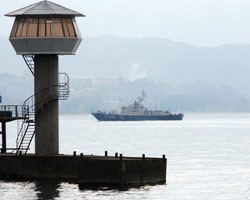
Address of the reception office of the Investigative Committee: Moscow, ul. Pervaya Frunzenskaya, d 3a
Address for writtent applications: 105005, Moscow, Tekhnichesky Pereulok, 2
Address of the reception office of the Investigative Committee: Moscow, ul. Pervaya Frunzenskaya, d 3a
Address for writtent applications: 105005, Moscow, Tekhnichesky Pereulok, 2

The investigating bodies of the Far Eastern Transportation Investigations Directorate of the Russia’s Investigative Committee have finished investigating a criminal case against 4 residents of primorye Territory – Gleb Klokov, Vladimir Bobrov, Ilya Buzin, Vasily Stasiv. Klokov and Bobrov are accused of 2 counts of a crime under part 3 of article 127.2 of the RF Penal Code (use of slave labor of two or more people using violence or threatening to use violence by an organized group), Buzin and Stasiv are charged with 1 count of the said crime.
According to investigators, in 2011, Klokov and Bobrov developed and executed a criminal scheme how to get maximum profit from marine shipping transportation by using slave labor of ship crews. They registered Damelo Group, Inc. on British Virgin Islands (offshore zone). They used the company as a cover-up to buy the right to use the SS ROSS ship which they registered under a flag of convenience in Tuvalu. Klokov on behalf of the offshore company built a crew in the city of Vladivostok, signed 6-month-long employment contracts and guaranteed monthly wages. The two involved in their organized group two of their acquaintances Buzin and Stasiv. The organizers made Buzin the captain of the SS ROSS and Stasiv a sailor. Both had a special role - to control behavior of the crew, force them to work in case of disobedience and by any means prevent any attempts of the crew to seek protection of their rights.
Members of the criminal group violated international and Russian laws and used forced labor of the sailors making them dependent on them. As soon as the sailors had got aboard SS ROSS they became hostage. The captain took away their personal documents making it impossible for the crew to leave the ship. While sailing in subtropical climate (the Indian Ocean and the Persian Gulf) the crew were put in conditions unfit for normal living and work: there was not enough food, fresh water was provided only several hours a day, cabins had no ventilation or cooling systems. The sailor did not get any salary. In addition, to enslave them even further, captain Buzin forged reports on violation of labor discipline or damaging the ship’s property. In open ocean the sailors could not leave the ship or refuse to work fearing that they would not get salary or would be physically abused. The accused took rough measures to handle discontented sailors. The investigators revealed and proved multiple facts that Klokov and Bobrob had arrived aboard the ship in person and beat up the disobedient to suppress the indignation. The organizers’ henchmen Buzin and Stasiv also threatened the sailors with physical abuse and beat them. The motor mechanic was injured and refused treatment or chance to get a doctor in a port. The crew members who despite prohibitions managed to get to the International Sailors’ Union and inform about slave labor on the ship were immediately transferred from the ship.
In the period between June 2011 and April 2012, the members of the criminal group disposed of the sailors to their own discretion demanding unquestioning obedience, used their labor and paid nothing for it.
Klokov and Bobrov used the same scheme to use slave labor of sailor on the SS Veles dry cargo ship (home port – Funafuti, flag - Tuvalu), which they practically owned. In the period between September 2012 and April 2013, Russian sailors worked on that ship in inhuman conditions and were also put in a dependent position while their labor was used for free.
In spring 2013, the sailors of the SS Veles returned to their homeland and applied to the Investigative Committee for help. The applications filed by the sailors helped to reveal the criminal group and prove the role of each of its members. In all there are 17 victims in the case, all of them were sailors on the SS Veles and SSROSS.
At present the criminal case with the approved indictment has been sent to court to be tried on the merits.